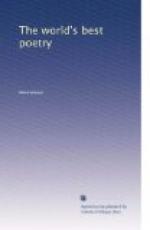I, of brute, human; ye, of human, gods.
So ye shall die, perhaps, by putting off
Human, to put on gods; death to be wished,
Though threatened, which no worse than this can bring.
And what are gods, that man may not become
As they, participating godlike food?
The gods are first, and that advantage use
On our belief, that all from them proceeds:
I question it; for this fair Earth I see,
Warmed by the Sun, producing every kind;
Them, nothing: if they all things, who inclosed
Knowledge of good and evil in this tree,
That whoso eats thereof forthwith attains
Wisdom without their leave? and wherein lies
The offence, that man should thus attain to know?
What can your knowledge hurt him, or this tree
Impart against his will, if all be his?
Or is it envy? and can envy dwell
In heavenly breasts?—These, these, and many more
Causes import your need of this fair fruit.
Goddess humane, reach then, and freely taste.”
THE FALL.
He ended, and his words replete with guile
Into her heart too easy entrance won:
Fixed on the fruit she gazed, which to
behold
Might tempt alone, and in her ears the
sound
Yet rung of persuasive words, impregned
With reason, to her seeming, and with
truth:
Meanwhile the hour of noon drew on, and
waked
An eager appetite, raised by the smell
So savory of that fruit, which with desire,
Inclinable now grown to touch or taste,
Solicited her longing eye; yet first
Pausing awhile, thus to herself she mused.
“Great are thy virtues,
doubtless, best of fruits,
Though kept from man, and worthy to be
admired,
Whose taste, too long forborne, at first
assay
Gave elocution to the mute, and taught
The tongue not made for speech to speak
thy praise:
Thy praise he also who forbids thy use
Conceals not from us, naming thee the
Tree
Of Knowledge, knowledge both of good and
evil;
Forbids us then to taste! but his forbidding
Commends thee more, while it infers the
good
By thee communicated, and our want:
For good unknown sure is not had, or had
And yet unknown is as not had at all.
In plain then, what forbids he but to
know,
Forbids us good, forbids us to be wise?
Such prohibitions bind not. But if
death
Bind us with after-bands, what profits
then
Our inward freedom? In the day we
eat
Of this fair fruit, our doom is, we shall
die.
How dies the serpent? he hath eaten and
lives,
And knows, and speaks, and reasons, and
discerns,
Irrational till then. For us alone
Was death invented? or to us denied
This intellectual food, for beasts reserved?
For beasts it seems: yet that one
beast which first
Hath tasted envies not, but brings with




